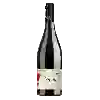
Winery Michel & Stéphane OgierL'Âme Soeur (Syrah de Seyssuel)
In the mouth this red wine is a powerful with a nice balance between acidity and tannins.
This wine generally goes well with poultry, beef or game (deer, venison).
The L'Âme Soeur (Syrah de Seyssuel) of the Winery Michel & Stéphane Ogier is in the top 40 of wines of Rhône septentrional.
Taste structure of the L'Âme Soeur (Syrah de Seyssuel) from the Winery Michel & Stéphane Ogier
Light | Bold | |
Smooth | Tannic | |
Dry | Sweet | |
Soft | Acidic |
In the mouth the L'Âme Soeur (Syrah de Seyssuel) of Winery Michel & Stéphane Ogier in the region of Rhone Valley is a powerful with a nice balance between acidity and tannins.
Wine flavors and olphactive analysis
On the nose the L'Âme Soeur (Syrah de Seyssuel) of Winery Michel & Stéphane Ogier in the region of Rhone Valley often reveals types of flavors of cream, cherry or oaky and sometimes also flavors of smoke, earthy or blackberry.
Food and wine pairings with L'Âme Soeur (Syrah de Seyssuel)
Pairings that work perfectly with L'Âme Soeur (Syrah de Seyssuel)
Original food and wine pairings with L'Âme Soeur (Syrah de Seyssuel)
The L'Âme Soeur (Syrah de Seyssuel) of Winery Michel & Stéphane Ogier matches generally quite well with dishes of beef, lamb or poultry such as recipes of beer goulash, merguez with lentils or old-fashioned chicken in a pot.
Details and technical informations about Winery Michel & Stéphane Ogier's L'Âme Soeur (Syrah de Seyssuel).
Discover the grape variety: Syrah
No one can agree on the origin of Syrah, the black grape variety found today in the Rhône Valley, Provence, Languedoc-Roussillon and southwestern France. Several legends speak of its possible origin in Sicily, Persia or Syria. Tests have finally revealed that it originated in the northern Côtes du Rhône valley. Syrah is a fragile grape variety, which fears drought and is susceptible to disease. Its long shoots are not very resistant to the mistral, which is why they are often tied up or cut short. It needs soil rich in trace elements to feed itself. In these conditions, it produces bunches of beautiful bluish-black grapes with medium-sized berries and sweet, spicy juice. Its red wines are deep in colour, with fruity, spicy and floral aromatic complexity and tannins that structure the whole. With little acidity, they are rather full-bodied and have a high alcohol content. Syrah also makes fruity rosé wines, which are pleasant and have a nice finesse.vinified on its own, Syrah is the only red grape variety of the AOC Cornas and is the majority in the AOC Côte-Rôtie and Hermitage. It is also recommended in the Côtes-du-Vallée du Rhône, Saint-Joseph and Châteauneuf-du-Pape appellations. Finally, the AOCs Palette, Baux-de-Provence, Corbières, Côtes-du-Roussillon, Fronton... also produce it. Today, Syrah is a grape variety that is constantly increasing in surface area throughout the world. It is growing in Italy, Australia, South Africa, Argentina and Mexico.
Last vintages of this wine
The best vintages of L'Âme Soeur (Syrah de Seyssuel) from Winery Michel & Stéphane Ogier are 2018, 2017, 2015, 2020 and 2016.
Informations about the Winery Michel & Stéphane Ogier
The Winery Michel & Stéphane Ogier is one of of the world's greatest estates. It offers 36 wines for sale in the of Rhône septentrional to come and discover on site or to buy online.
The wine region of Rhône septentrional
Côtes du Rhône is a regional appellation in the Rhône Valley in eastern France. It applies to red, rosé and white wines, and includes more than 170 villages. The area follows the course of the Rhône southward for 125 miles (200 km) from Saint-Cyr-sur-le-Rhône to Avignon. A small portion of the wines in the appellation are white wines.
The wine region of Rhone Valley
The Rhone Valley is a key wine-producing region in Southeastern France. It follows the North-south course of the Rhône for nearly 240 km, from Lyon to the Rhône delta (Bouches-du-Rhône), near the Mediterranean coast. The Length of the valley means that Rhône wines are the product of a wide variety of soil types and mesoclimates. The viticultural areas of the region cover such a distance that there is a widely accepted division between its northern and southern parts.
The word of the wine: Rootstock
American vine on which a French vine is grafted. This is the consequence of the phylloxera that destroyed the vineyard at the end of the 19th century: after much trial and error, it was discovered that the "pest" spared the roots of the American vines, and the technique became widespread.














